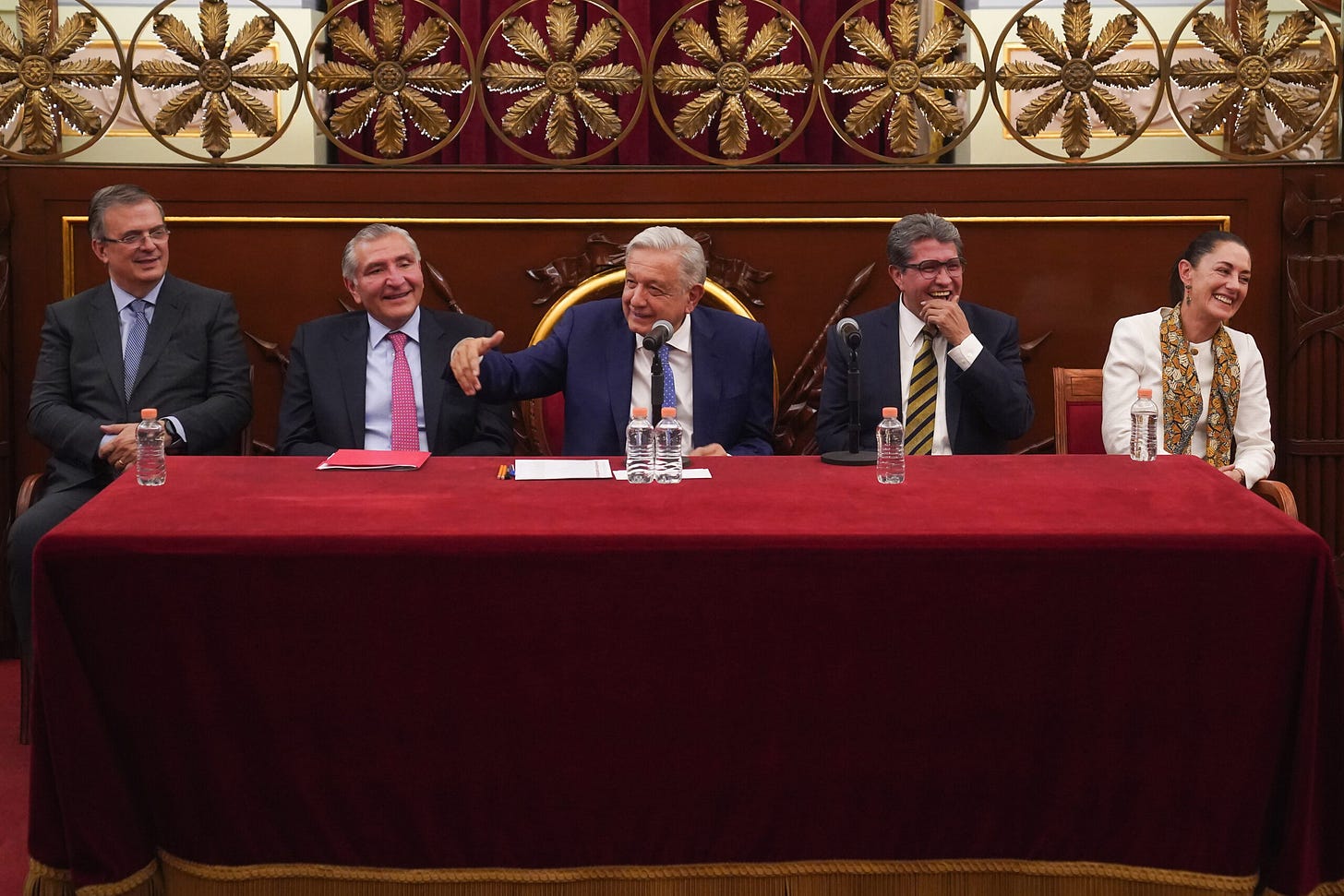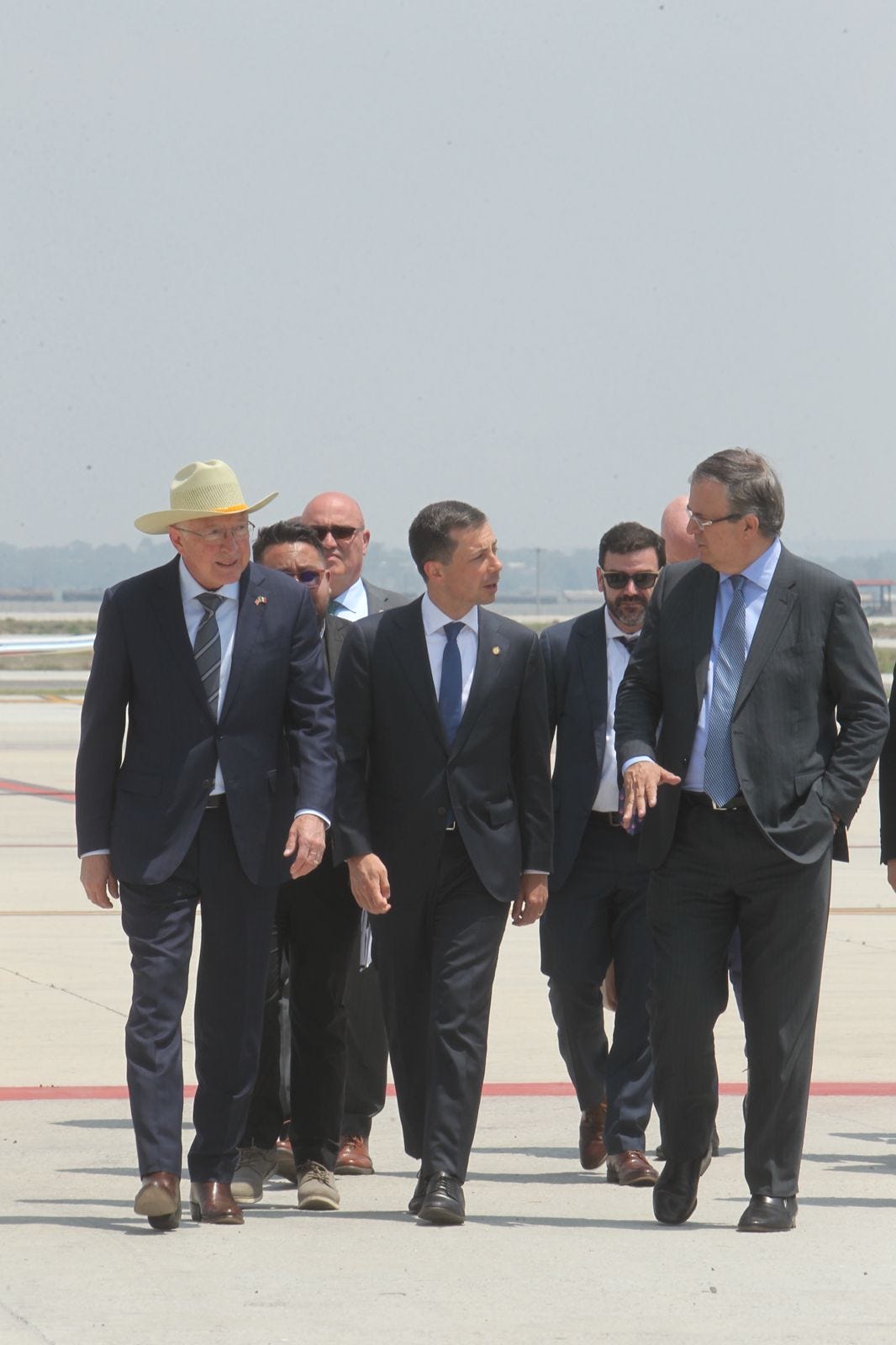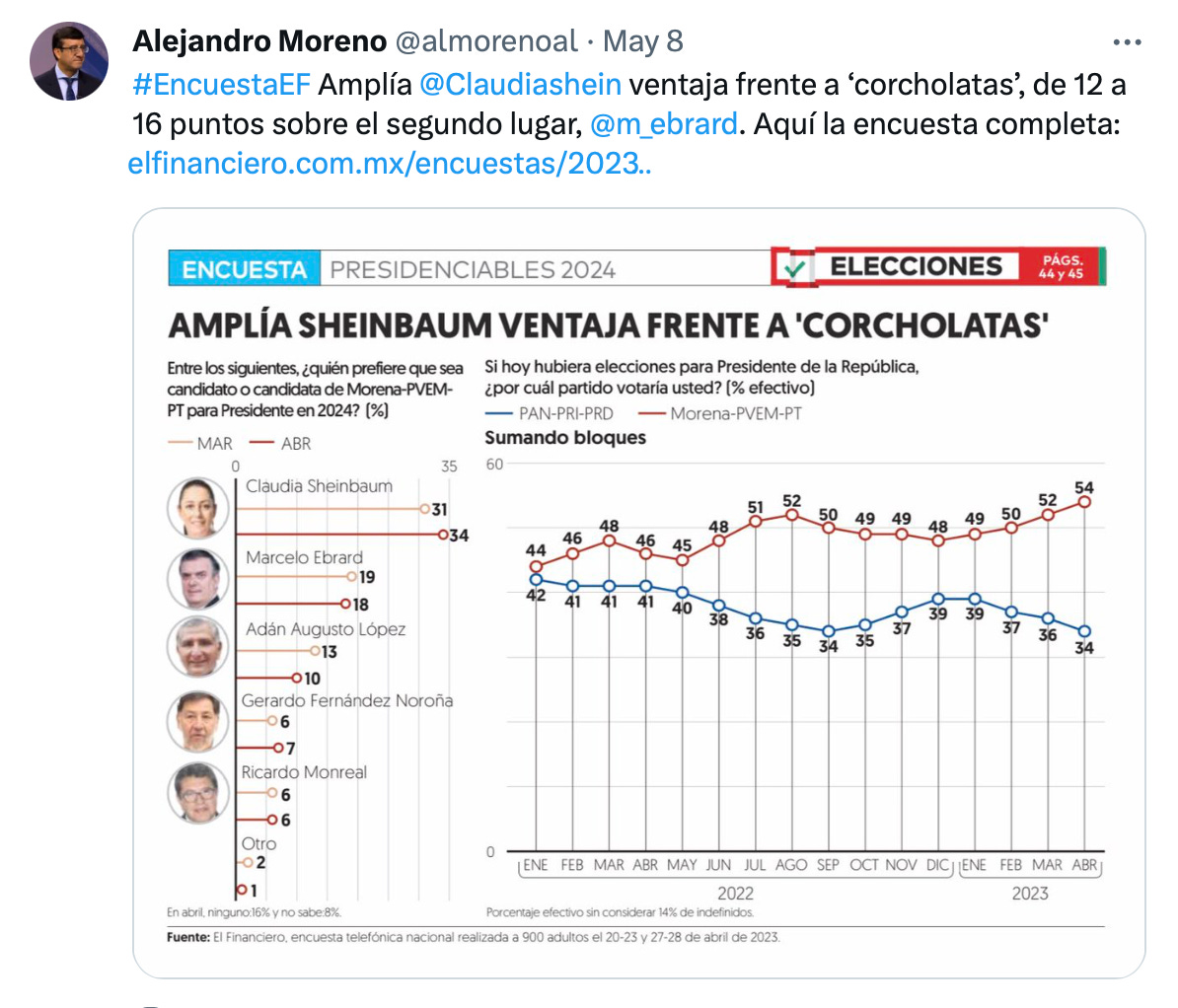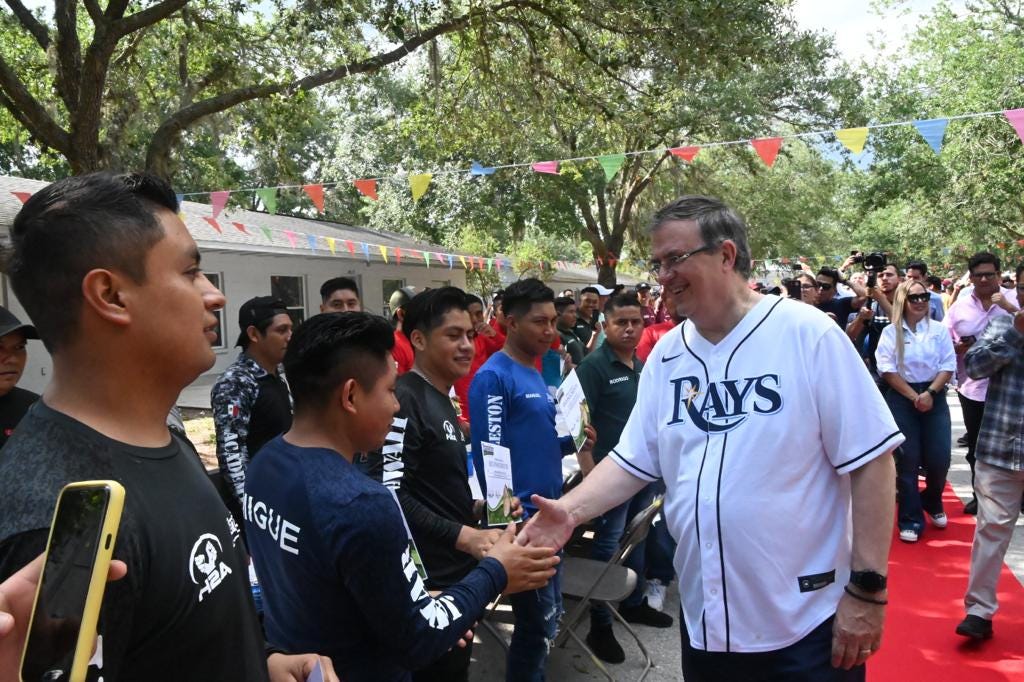Mexico's ruling party unveils process for succeeding AMLO
MORENA plans to pick its 2024 candidate through a poll. But the ritual is reminiscent of past years when presidents chose their successors in an attempt to influence politics after leaving office.

No debates. No criticizing other candidates. No talking with supposedly hostile press.
The ruling MORENA party on Sunday outlined the process for picking its 2024 presidential candidate – which will occur via a series of polls at the end of August with the winner announced Sept. 6.
The MORENA candidate will run to succeed President Andrés Manuel López Obrador, who is constitutionally prohibited from seeking a second term – but, in the tradition of Mexican presidential politics, has invested heavily in placing his preferred successor on the ballot.
Pro-AMLO pundits breathlessly praised the process for choosing the MORENA candidate as “unprecedented” and and a “master stroke,” fitting with an administration the president has branded transformational.
Critical voices, however, saw history repeating itself – albeit in a peculiar way – through the dedazo (the big finger) or destape (unveiling), in which the president picks the successor, then the political class rallies around the chosen figures with exaggerated expressions of support. Sociologist Rodolfo Soriano-Núñez said of the process in a Twitter thread:
“What MORENA did is a frank and open regression to the noisy politics of the PRI in the 80s. There are no signs that this improves the quality of democracy inside the party or in the country more generally. Anybody who follows (Mexico’s) public life knew this was coming. Nobody halfway informed could be surprised.”
The president’s pasarela reloaded

Some pundits recalled the pasarela (catwalk) organized by president Miguel de la Madrid in 1987 for picking a potential successor. He settled on Carlos Salinas, who won the scandalous presidential election the following year. But since then, “No Mexican president has been able to carry the person they opted for to the presidency,” wrote Enrique Quintana in the newspaper El Financiero.
Fernando Dworak, a political analyst in Mexico City, told this newsletter:
“It’s a dedazo. Naturally it’s a dedazo knowing clearly that all the participants are in an open pasarela. … The ritual, as Miguel de la Madrid did it, was to slow people down (the perceived favourites) to see who could be the designated person and then start the process of unveiling them.
“Obviously, it’s also something that is serving to legitimize a decision that we don’t know is made or not.”
Others saw MORENA – at behest of the president – picking a process for preserving party unity through a scheme which would guarantee the losing candidates spaces in the next administration and avoid exposing their shortcomings through debates and critical interviews.
“Andrés Manuel is convinced this is the way to protect his candidate: not exposing her to those those internally who would find defects or deficiencies,” wrote Salvador Camarena in El Financiero, referring to the president’s perceived favourite, Mexico City Mayor Claudia Sheinbaum.
Writing in Reforma, columnist Jesús Silva-Herzog Márquez said of the process:
“The MORENA candidate who emerges in the poll in September will not be a candidate, but a defender of transformation, or something like that.
“The ruling party prohibits debates between the contenders. They are invited to talk about their proposals, but the possibility of questioning their rivals is eliminated. MORENA is terrified of internal controversy. How can a political process that does not allow contrast, not only of ideas, but of personalities, trajectories, styles, be called democratic?”
Mostly, though, AMLO is trying to avoid the fate of his successors: regretting the person they picked to replace them. He also strives to achieve what they all wanted: controlling their successors and party politics after leaving office.
Obradorismo without Obrador
López Obrador has long had a preference for picking candidates through polls; party primaries are rare in Mexico. The MORENA process includes a party sponsored poll with a sample from the entire country (not just members), along with a poll from each of the four potential MORENA candidates. Each poll will receive equal weighting. (Two candidates come from MORENA allies and will not conduct polls.)
At a last-minute gathering of the corcholatas (bottle caps in Spanish, but slang for potential presidential successors) last week, AMLO told the contenders to resign their posts if they planned to participate in the process (common practice in Mexico politics), according to press reports.
He also laid out a plan under which the runner up would become MORENA Senate leader, the third place finisher lower house leader, and four place a spot in cabinet.
“It turns the succession not into a handing of the baton to a person, but rather a team,” wrote Jorge Zepeda-Patterson in an El País column titled “A master stroke.” He continued in a column:
“With this, López Obrador is achieving several things simultaneously: he imposes the notion that what follows is not a matter of people, but of a political and ideological current. … Coordinators of the legislative branch were traditionally appointed by the incoming president. But on this occasion they will have been rivals of that president and they would be there by design of the movement’s founder. … In the hypothetical case that Morena’s successor in the National Palace turns out to be a fiasco due to incapacity or disloyalty … from the legislative branch obradorismo could partially neutralize the executive.”
MORENA to candidates: play nice
The MORENA national committee established rules for the “pre-candidates” and party members to follow:
The pre-candidates can speak with party members and holding “informative” assemblies.
They must act “austerely” without spending public money or excessive spending on publicity, avoid “herding” voters to assemblies with promises of money or gifts.
Avoid accepting accepting money from public, business or “illicit” sources (read: drug cartels.)
The president, governors, public officials and MORENA officials cannot get involved in the contest or endorse candidates.
All debates are to be avoided, along with criticism of fellow pre-candidates.
The pre-candidates “will avoid reactionary media,” which the party considers “conservatives, adversaries of the Fourth Transformation and partisans of the old regime.”
Candidates declaring
The race to succeed AMLO is expected to be a three-person race with Sheinbaum leading early polls over former foreign minister Marcelo Ebrard – who resigned Monday – and interior minister Adán Augusto López. Former MORENA Senate leader and Zacatecas governor Arturo Monreal also declared along with candidates from two smaller MORENA allies: former Chiapas Gov. Manuel Velasco for the Green Party and former lower house member Gerardo Noroña Fernández, a firebrand for the PT.
Pollster Alejandro Moreno of El Financiero gave Sheinbaum a 12 to 16 point advantage in his most recent poll of possible candidates. The polls and perceptions of AMLO’s preference for Sheinbaum has fuelled speculation of Ebrard jumping to another party – especially with the opposition in disarray and lacking a strong candidate. But Dworak, the political analyst, saw the opposition’s disarray strengthening the president’s control over the succession process and disincentivizing any departures.
“Where is he going to go after?” Dworak said of Ebrard. “Jumping to the opposition is jumping into the abyss. It’s really ending his his career.”
He gives AMLO better odds than past presidents at pulling off his attempt at controlling his successor and party post-presidency – at least for the short-term after leaving office.
“The PRI (which ruled 71-years) was an institution where all the political groups … knew there were clear rules around the renovation (of leaders). Here, everything depends on a single person. … If in these pacts that offer the second and third place candidates spots in the cabinet, who is going to assure that they get into cabinet? The strong man. …
“So long as the president continues being the MORENA strongman, everyone knows that it’s better to remain close.”
AMLO MEETS SECRETARY PETE BUTTIGIEG ‘UNDER PROTEST’

U.S. Transportation Secretary Pete Buttigieg travelled to hinterlands north of Mexico City for a June 7 tour of the thinly-used Felipe Ángeles International Airport (AIFA) – one of AMLO’s pet projects, which he has been keen to show off to visiting dignitaries.
AMLO met with him later at AIFA “under protest,” to have Mexico regain its Category 1 status from the FAA – which downgraded the country in May 2021. The president offered one of his usual non-sequiturs in expressing his displeasure:
“Why do I say under protest? First, because who are they to judge another country? With what authority do they rate the attitude, the functioning in another government, in another country? … The second is: How did they take away Category 1 if when narcotics traffickers ran the airport it had Category 1?”
The reference to narcos stemmed from revelations during the trial of former public security secretary Genaro García Luna – convicted earlier this year in a U.S. court of taking bribes from the Sinaloa Cartel – that cartels colluded with the Federal Police to move illegal merchandise through the Mexico City International Airport (AICM).
‘There are differences’
AMLO said the day after the meeting: “There are differences, but these are important issues, we have to come to an agreement.” Along with regaining Category 1 status, AMLO has decreed an end to cargo flights at the AICM, which would force airlines and freight companies to a move to AIFA – 28 miles away – where they lack infrastructure. Regaining Category 1 would also allow Mexican airlines to start service from AIFA to U.S. as the opening of new routes is prohibited.
But he returned to his non-sequiturs, once again confusing airport operations with aviation safety issues. He ranted at his June 8 morning news conference:
“I told them with a lot of frankness and respect, ‘How are you going to be haggling with us about Category 1, if now the (AICM) is taken care of by the Secretary of the Navy, the other airport by the National Guard. Suitcase thefts have gone down, the thefts of those who use the airport services, contraband, drug trafficking, in other words: there is more control, and now they don’t want to give us category 1?
“And when the Mexico City airport was run by drug traffickers, when the drug-State had category 1. And where were those who do the evaluations? They didn't see anything?’”
Mexico briefly lost its Category 1 standing in 2010 – during García’s time as head of the Federal Police – but regained it that same year.
An unsafe airport?
Mexican aviation safety has come under scrutiny after a series of near misses at the AICM, which has fallen into a state of disrepair since AMLO cancelled work on its already under-construction replacement in late 2018 and started building AIFA on the site of an existing air force base.
The FAA said at the time of its downgrade:
“During its reassessment of the Agencia Federal de Aviacion Civil (AFAC) from October 2020 to February 2021, the FAA identified several areas of non-compliance with minimum ICAO safety standards.”
Adding to the problems is the location of AIFA, which complicates air traffic patterns in the high altitude Valle de México – potentially compromising aviation safety. Mary Anastasia O’Grady wrote on the issue last year for The Wall Street Journal:
“Pilots landing at the busy Benito Júarez have to skirt the other airport. This requires that they begin their approaches at higher altitudes and closer to the mountains where the air is unstable, then descend steeply. On May 4 (2022) the international pilots association cited several incidents of ‘low fuel states due to unplanned holding, diversions for excessive delays, and significant GPWS [ground proximity warning system] alerts where one crew almost had a controlled flight into terrain.’”
Negotiating air safety?
AMLO has made a point of welcoming foreign dignitaries at the AIFA, including President Joe Biden in January, portraying their arrivals as endorsements of the airport. Biden’s arrival at AIFA even appeared to be part of the negotiations prior to the January North American leaders’ summit. The Mexican president’s emphasis on getting AIFA up and running has fuelled speculation that he might be wanting to negotiate on Category 1. (See above tweet.)
CDMX GOV’T COLLECTED EARTHQUAKE AID FOR TURKEY. IT NEVER ARRIVED
Mexicans give generously after natural disasters – such as the 207 earthquake rocking the capital and nearby states, but also abroad. The Mexico City government established centres for collecting supplies for the Feb. 6 earthquake devastating Turkey and Syria – where Mexican soldiers and rescue teams applied their extensive experience of digging for survivors under rumble.
But the country also has a sad history of donations being misappropriated or squirreled away in warehouses and used by politicians for plying poor voters ahead of election in crass vote-buying schemes. One of the most infamous examples played out in the state of Morelos to the south of Mexico City during the devastating 2017 earthquake, when the state’s Catholic bishop warned that state police had stopped trucks carrying relief supplies from Caritas chapters across the country (the church’s charitable arm) and was planning attempting to rebrand the items with political propaganda from the governor’s left-wing party. (The bishop and church in Morelos had endured public persecution at the hands of the governor after denouncing corruption and insecurity and, he says, taking positions at odds with the governor on social issues.)
The Mexico City government claimed to have collected 30 tons of supplies, which were delivered by SEDENA, according to an open records request by journalist Pamela Cedeira. But SEDENA said in a statement at the time that 20 tons of the 100 tons of relief it delivered to Turkey was collected by the Mexico City government.
Tracking missing donations with AirTags
Cerdeira donated two items at a CdMx collection centre: a bag of rice and package of toilet paper. She inserted two Apple AirTags into the donated items, then waited for them to arrive in Turkey. Instead, she tracked down the items to locations in Mexico City: the toilet paper ended up in a public market, while the bag of rice was being stored in a public school – where a local lawmaker ran a food bank.
The Mexico City government’s No. 2 Martí Batres published a video, in which he promised the comptroller’s office would investigate. He also held up a piece of paper with inadvertently conflicting information: he claimed 30 tons had been delivered, but it showed SEDENA only signed for 20 tons.
An investigation with a ‘political bent’
Mexico City Mayor Claudia Sheinbaum – an AMLO acolyte, who seldom strays from the line set out by the president – turned conspiratorial, questioning why the story took so long to be published and telling the media, “It seems to have a political bent.”
Sheinbaum is expected to step down this week as mayor to pursue the presidency. She plays up her scientific credentials – calling herself “Dra” on social media, even while her government distributed Ivermectin to COVID patients without telling them they were part of an experiment, and repeatedly hindered a pair of sleuths tracking the scandalously high excess mortality figures in Mexico City – and portrays herself as leading a competent, progressive government. It’s won fans in the foreign media, which has warmed to the narrative of Mexico’s first female president with a progressive bent and published puff pieces accordingly.
Commentators said the response fits with the López Obrador and Morena scorn for transparency – as the AMLO administration is hobbling the country’s transparency institute, which handles public records requests. Political science professors and pundit Denise Dresser tweeted, “Minimizing it does not show ‘transformation’” – AMLO’s branding for his administration – “but pettiness and old PRI reflexes.”
For her part, Cerdeira said she wanted to wait and find out what became of her donations prior to publishing the story.
CONFRONTATION OR EXECUTION?
Video from security cameras in the border city of Nuevo Laredo show a black pickup suddenly swerving into the frame and crashing into a wall. Soldiers approach the vehicle, shoot out the tires, pull out five suspects, disarm them, kick them and line them up against the wall. El País, which obtained the May 18 video footage, along with Univision, said of what occurred next:
“Minutes later, in a confusing scene, the military appear to be sheltering from something, while shooting at the civilians. The only survivor later died in the hospital.”
Soldiers then appear to be altering the scene.
Mexico’s federal prosecutor’s office (FGR) opened an investigation into the case, which became public June 6. SEDENA said in a Saturday statement that the military justice prosecutor had issued arrest warrants for 16 soldiers on charges of violating military discipline. The charges were independent of any filed by the FGR, it said, adding the soldiers were being held at a military prison in Mexico City.
AMLO, who has tasked the military for public security duties, said of the case at his morning press conference the next day: “There seem to have been executions and this cannot be allowed.”
‘Ya no hay masacres’
The president often says in his speeches, “Ya no hay masacres” (There are no longer any massacres) – a claim meant to put his administration on a morally superior plain than his predecessors. He also claims, “In Mexico, the state has stopped being the main violator of human rights,” while insisting the army is incapable of corruption. But he said of the apparent executions at his press conference, “These are isolated cases.”
News organization Animal Politico fact checked the president’s claim and found it false – with at least three similar cases of soldiers shooting civilians, claiming 14 lives, in Nuevo Laredo since 2020.
The Jesuit-run Miguel Agustín Pro Juárez Human Rights Center – which has investigated military abuses for 35 years – noted, “Although they say the opposite, the army is the same as before. It’s elements carry out executions and later plant weapons to cover up.” It added, “The facts are only investigated because there’s a journalistic investigation and work by civil society: actors the president denigrates.”
Attacking army critics

Centro Pro represented eyewitnesses from a previous army massacre at the town of Tlatlaya in Mexico state, near the border with Guerrero state, where soldiers were accused of executing 22 alleged members of the Guerreros Unidos gang in 2014. The Associated Press discovered evidence of soldiers appearing to have executed people at the scene. One year later, Centro Pro produced army documents, reading, “Soldiers should operate on a mass scale at night and reduce daytime activities, with the aim of killing criminals at night.”
AMLO, however, recently took aim at Centro Pro, accusing it of using the June 2022 slaying of two Jesuits in the Sierra Tarahumara for “questioning us.” He mentioned the Centro Pro three times in a week, accusing it of “wanting us to fail,” a reference to his government’s truth commission into the 2014 attack on the 43 Ayotzinapa students. He also claimed Centro Pro tried “showing that we protect human rights violators” – a reference to accusations that AMLO allowed the army to derail investigations into the atrocity.
He again denied accusations the army planted Pegasus spyware on the Centro Pro, telling the country for not the first time:
“I repeat: we’re not the same. In this government there’s no spying, there’s no torture, there are no disappearance carried out by the state, there are no massacres. … Human rights organizations must take into account, must consider that the state at president is not main violator of human rights as it was before.”
Centro Pro staff have admitted having hopes for an AMLO administration curtailing the use of the army in public security – only to see AMLO depend heavily on the country’s hermetic and unaccountable armed forces for everything from fighting narcos to building and operating airports to running the customs service.
The centre said in response to AMLO’s attacks:
“It’s an army that either deceives the president by denying what is obvious in the face of overwhelming evidence. Or else it benefits from the cover-up he provides it, which would imply that the ruler has already decided his government depends on the military establishment and ensures them impunity in exchange.
“There is no other feasible scenario beyond this dilemma which is currently undermining current efforts such as clarifying the Ayotzinapa case or the military crimes of the ‘Dirty War’ – and which is caused by the unprecedented delivery of resources and powers to the armed forces.”
ANOTHER ARMY CRITIC SPIED ON
An investigation from The New York Times found Mexico’s human rights undersecretary Alejandro Encinas – the man responsible for the truth commission into Ayotzinapa – had Pegasus spyware planted on his smart phone. AMLO failed to defend him, even though Encinas is considered close with the president – so close that he succeeded AMLO as interim Mexico City mayor in 2005 when AMLO stepped down to run unsuccessfully for president.
Now the head of another truth commission into the country’s Dirty War of past decades was targeted with Pegasus spyware, too, according to a Washington Post investigation. The Post story said:
“Pegasus spyware was detected in the phone of Camilo Vicente Ovalle, according to the forensic analysis by Citizen Lab, a digital research center at the University of Toronto. Vicente Ovalle, who coordinates the work of the truth commission, had received an email in December from Apple warning he might have been targeted by ‘state-sponsored attackers.’
“The alleged hack is part of a mounting trove of evidence that civilians looking into human rights abuses by Mexico’s armed forces — including activists, journalists, even officials close to the president — are being targeted with malware.”
MEXICO PLANS LEGAL ACTION OVER FLORIDA LAW
AMLO recently tore into Florida Gov. Ron DeSantis for the passage of a tough migration enforcement bill, telling Hispanics in the state to “not give him a single vote.” (See the May 28 newsletter.) He also accused the governor and Republican presidential candidate of “politicking” – a common accusation from AMLO for anything statement he deems anti-Mexican.
Ebrard followed up with a trip to Florida, where he promised to convene a June 30 gathering of Mexican communities to review the Mexican government’s plan for defending Mexican migrants in the United States.
The foreign ministry (SRE) again tore into DeSantis and threatened legal action over the 16 migrants being flown to California – including, the SRE said, a Mexican citizen from the state of Chiapas. The SRE said in a June 8 statement:
“The government of Mexico energetically condemns the practice of transporting migrants from border states with Mexico to other parts of the United States for political and electoral purposes, as has occurred in the specific cases of Massachusetts, New York and recently from the state of Florida to the city of Sacramento, California. Said actions violate human rights, constitutional rights and people’s dignity. …
“Legal and diplomatic measures are being explored in the face of this worrisome practice.”
Mexico has threatened and pursued legal actions in the United States during Ebrard’s four and a half years as foreign minister. Ebrard said the SRE planned to take legal action in the United States and pursue terrorism charges after the August 2019 mass shooting at an El Paso Walmart store, which claimed 22 lives – including eight Mexican citizens.
The SRE also filed a lawsuit against eight gunmakers in U.S. federal court, arguing the defendants were deliberately flooding Mexico with weapons, which armed the country’s drug cartels and fueled violence. The case was dismissed in September 2022, though the SRE has appealed and also filed suit against gun dealers in Arizona.














